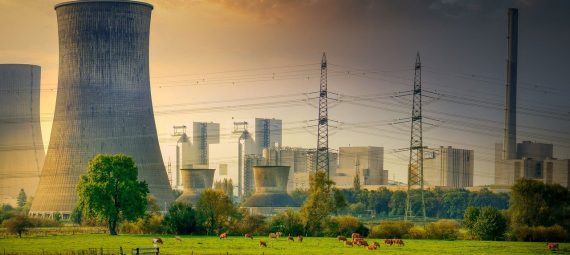Theresa Zettl, Piotr Azia
In Germany, for a long time the discussion has focused very much on what Germany no longer wants, namely electricity from nuclear power and electricity from coal-fired power. However, if Germany does not succeed in transforming their energy system in such a way that they can replace these power generation capacities with renewable energies, then this will lead to Germany importing precisely this electricity, i.e. nuclear power from their western neighbors and coal-fired power from their eastern neighbors.
The war in Ukraine highlights Germany’s dangerous dependence: Not only natural gas is imported from the east, but also oil and coal. Power plants, factories and domestic heating systems are threatened with standstill if supplies are cut off.
According to data from the Federal Institute for Geosciences and Natural Resources (BGR), some of which have not yet been published, Germany’s energy dependence in 2020 reached a total of 64 percent. Energy dependence is defined as the ratio of net imports and available gross energy. According to the new BGR figures, Russia accounted for 34 percent of Germany’s petroleum imports. In terms of German consumption, Russian natural gas supplies accounted for just over 50 percent. Coal imports came to 45 percent from Russia. Coal-fired power plants currently account for 9.3 percent of Germany’s electricity requirements.
Germany should have learnt a lesson: Energy resources of this magnitude cannot be replaced at short notice, as a complete replacement of a market position like Russia has in coal, gas and oil is extremely difficult to impossible at short notice.
Germany is highly dependent on energy supplies from Russia: in 2020, Germany imported 42% of its crude oil from Russia, followed by the UK and the US (14% each). Although the U.S. has been one of Germany’s oil suppliers again since 2017 and volumes imported from overseas are also increasing, the share of Russian oil still rose by 4% in 2020, compared to 2019.
The dependency on natural gas supplies is even more serious: Here, Russia has a share of 55%, followed by Norway with 31%. Netherlands supplies around 13% of Germany’s natural gas requirements – and the trend is downwards. Compared with crude oil, which has always been sourced in large quantities by tanker, thus allowing greater diversification of supplier countries, Germany is highly dependent on pipelined gas, which severely restricts the number of suppliers. This is where the policy of cheap gas takes its toll: pipeline gas is significantly cheaper than purchasing liquefied gas by tanker. While most European countries have built their own import terminals for sourcing LNG by ship in recent years, Germany has so far lacked the political will to promote such projects and thus the economic viability of such a terminal. Even today, the construction of an LNG terminal is not economically feasible.
To come back to my intro: There are currently three nuclear power plants in operation in Germany: Isar 2, Emland and Neckarwestheim 2. The amendments to the Atomic Energy Act, which came into force on August 6, 2011, stipulate that the last nuclear power plants in Germany are to be decommissioned at the end of 2022.
Should Germany really stick to closing the remaining nuclear power plants?
Given the current situation with the war in Ukraine, the energy market and the massive rise in costs, maybe the rushed closing of nuclear power plants, without real alternatives and the widespread availability of cheap, sustainable energy was not a good idea after all? Should the German government take into account the current situation and delay the closing down of nuclear energy plants and consider even restarting the nuclear plants which may be still operational at short to medium notice? This would give it time to design a fully thought through, carefully planned sustainably energy policy, capable of covering current and future needs, without depending for such vital supplies on unstable, authoritarian states.
ELfR Panel discussion on “Nuclear and renewable energies”
On 16.02.2022 we had a discussion on “nuclear energy and renewables” with our panelists Anders Basbøll, Ben Burgers, Claudia Gasparrini and Paweł Kołodziejczyk.
Shall you have missed it you can watch it on our YouTube channel:
Author Profile
-
Co-Founder of European Liberals for Reform
Chairperson of ELfR Working Group Health
ALDE Individual Members Steering Committee Member (2022-2023)
Social Media & Digital Marketing Expert, Blogger
Favorite Topics: Health, Society, LGBTQI
Latest entries
 Elections13/04/2022Presidential elections in France 2022
Elections13/04/2022Presidential elections in France 2022 Human Rights22/03/2022ELfR to support Manifesto for inclusive gender-based violence law
Human Rights22/03/2022ELfR to support Manifesto for inclusive gender-based violence law EU07/03/2022Five possible scenarios for the outcome of the Ukraine war
EU07/03/2022Five possible scenarios for the outcome of the Ukraine war Ukraine06/03/2022ELfR starts petition to nominate Volodymyr Zelenski for Sakharov Prize
Ukraine06/03/2022ELfR starts petition to nominate Volodymyr Zelenski for Sakharov Prize
Post Disclaimer
The opinions expressed by the author of this post do not necessarily represent the opinions and policies of ELfR.

